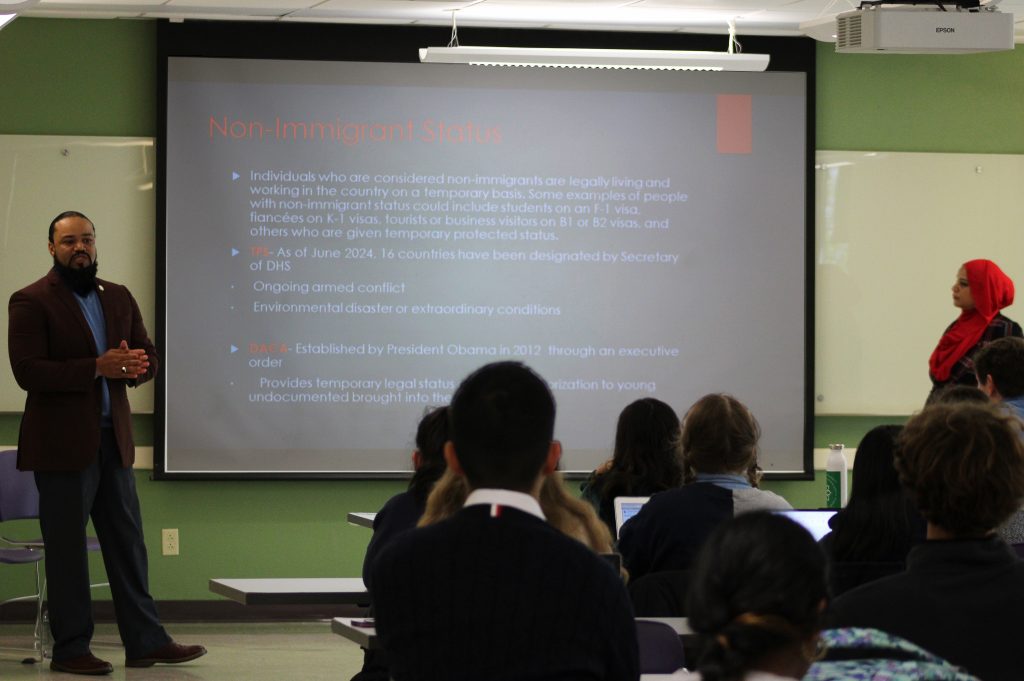
As part of Binghamton University’s weeklong LOCO festival programming, two speakers from the American Civic Association spoke about immigration statuses and refugee resettlement.
Featuring Hussein Adams, the association’s executive director and chief executive, and Laila Hernandez ‘13, MPA ‘18, the organization’s deputy director, the presentation provided an overview of the ACA’s role in providing aid and services to immigrants and resettling refugees in the community. Adams spent his portion of the lecture discussing four basic immigration statuses. Hernandez then highlighted the organization’s support and placement programs for refugees.
Kent Schull, the director of the Center for Middle East and North Africa Studies and an associate professor of history, said the ACA has been active locally for 85 years, assisting immigrants and refugees with their legal and advocacy work.
“The American Civic Association has been a pillar of our community for a long time,” Schull said. “And it is just a distinct pleasure for me to be able to welcome Mr. Adams and Ms. Hernandez here today to speak with us.”
In laying out the four main immigration statuses — citizens, residents, nonimmigrants and undocumented immigrants, Adams said the vast majority of the public is not informed on each classification. Anyone born in the United States is a citizen, while Adams noted that green card holders may apply to become citizens after several years of residency. In the United States, there are two types of residents — conditional and legal permanent residents.
Conditional residents, according to Adams, receive a green card before completing two years of marriage. The immigrant and their spouse must then jointly file to remove the condition before two years have passed or risk deportation. Legal permanent residents have a green card and can work and live in the country permanently.
It is possible to become a permanent resident if an employer or family member sponsors the green card.
“Many U.S. citizens have family members outside of the United States,” Adams said during his lecture. “Many legal permanent residents and green card holders, they have family that live and reside outside of the United States and they want to bring them. They want to join their family.”
Adams moved to discuss nonimmigrant status, meaning someone is legally residing and working in the United States but only temporarily. He mentioned several instances where an individual would have nonimmigrant status, like students on a visa or those granted temporary protected status, meaning they are fleeing a country experiencing an armed conflict or environmental disaster. Undocumented migrants are in the country illegally and are not able to work.
After Adams concluded his portion of the talk, Hernandez addressed the discrepancies between refugees and immigrants, dispelling misinformation that often loops the two in the same category. She said “refugee” is a status acquired outside the United States.
Last year, the ACA resettled 55 refugees, and this year they are projected to resettle 70. Hernandez said that while refugees cannot vote until becoming U.S. citizens, they have rights to health care, legal assistance, family reunification, privacy and dignity, among other protections, comparing their status to that of a permanent resident.
“Not only do they contribute economy-wise, they also contribute culturally, to our diversity and rather than drain on our communities, refugees — with their high employment rate and entrepreneurial spirit — sustain and strengthen their new hometowns,” Hernandez said.
According to a 2023 American Immigration Council report, refugees in the United States, in 2019, produced $93.6 billion in household income, with $25 billion contributed in taxes. Refugees that have resided in the United States for at least 20 years have a median household income of $71,400, the report said, greater than the median achieved by U.S. households overall.
Starting in May 2023, the ACA’s Reception and Placement Program began to welcome refugees. One of the challenges the program faces is a lack of funding, and with only $1,325 per person, they have 90 days to help them. The organization relies heavily on community partners and members to help resettle these families with limited resources. Language is another barrier for these refugees as they struggle to find work.
Speaking with Pipe Dream after the event, Adams and Hernandez said today’s political climate plays a role in fostering hateful attitudes toward immigrant and refugee populations. They also commented on the importance of addressing immigration and catering to immigrant and refugee populations on a local level.
“I think the aspect of dispelling myths, the boots on the ground type of work, even coming into this University — these are students,” Adams said. “It is vital to inform them, educate them at a young age, so that 10, 15, 20 years later they [don’t] have these twisted ideologies and misconceptions as to the different statuses. Most people don’t even understand that a refugee comes into the United States with status.”
He proceeded to provide an anecdote of a man he encountered at a gas station, who became angry with the owner after he accidentally turned on the wrong pump, yelling at him to go back to his country. Adams said incidents like this highlight the deep-rooted nature of racism.
Students from Schull’s Palestinian history class — which he said delves into the displacement of the Palestinian people — attended the lecture.
“I wanted them to be able to make some of those connections here that this isn’t just something over there, wherever there is, but this is something also at home where all of us at one point in time, I think, have gone some place new and tried to to get on our feet and [know] what it means to do that,” Schull said.


